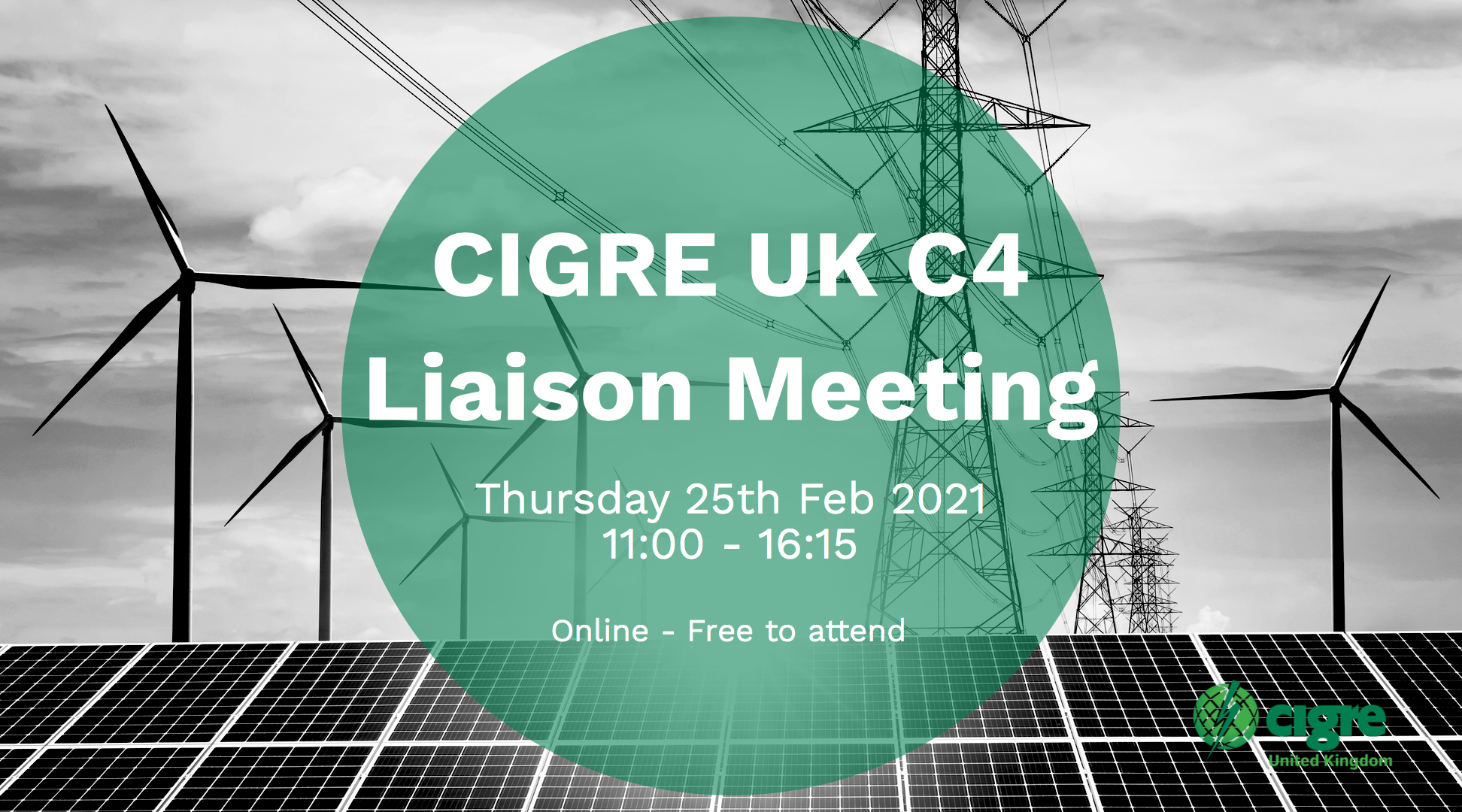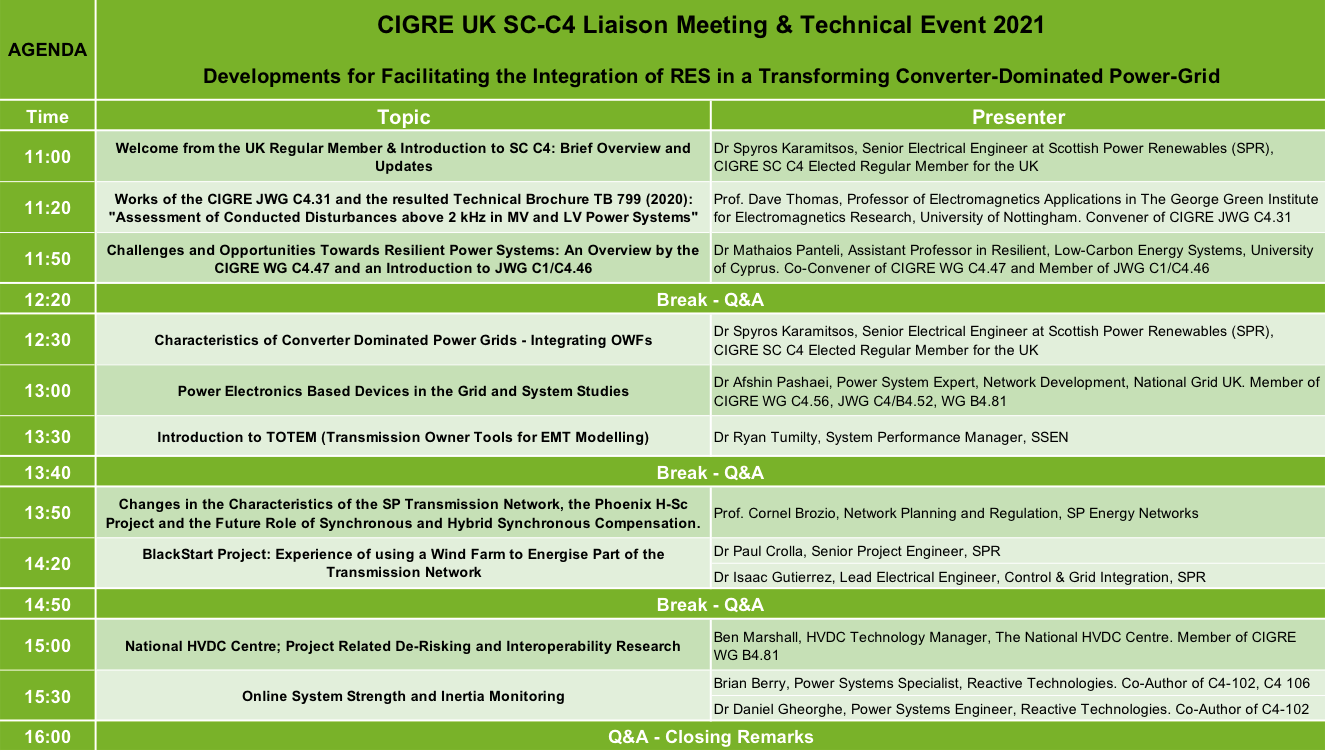
This CIGRE UK Study Committee C4 Technical Event held in conjunction with the C4 Liaison Meeting aims to bring together experts from industry and academia to present certain issues and discuss developments towards facilitating the integration of renewable energy and the transformation of the power system into a future converter dominated grid.
The purpose of the SC C4 Liaison Meeting is to provide a high-level overview of the ongoing activities in CIGRE related to C4 (Power System Technical Performance) led by UK Regular Member, Spyros Karamitsos. Technical Brochures published in the last year will be highlighted, along with a status update on the active SC C4 Working Groups where the UK has an interest. You will also hear about the latest work items approved by the C4 Study Committee during the Paris e-session and possible work items that could be proposed in the future.
Joining the meeting
Simply register from this page and you will be sent an email confirmation that will include the details of the CISCO WebEx login. Please keep this safe as you will need this on the day of the meeting.
TO REGISTER FOR THIS EVENT
Agenda

C4 Study Committee Mission, Technology & Scope
Within its technical field of activity, Study Committee C4 deals with methods and tools for analysis related to power systems, with particular reference to dynamic and transient conditions and the interaction between the power system and its apparatus/subsystems (including external causes of stress and other installations). Specific issues related to the design and manufacturing of components and apparatus are not in the scopes of SC C4, as well as those specifically related to planning, operation and control, apart from those cases in which a component, apparatus, or subsystem behaviour depends on, or significantly interacts with, the performance of the nearby power system.
Within this framework, specific areas of attention include:
- Power Quality Performance: Continuity of end-to-end electric power supply and voltage waveform quality (magnitude, frequency, symmetry). Analysis covers emission assessments from disturbing installations, measurement and simulation methods, identification of quality indices, monitoring techniques, immunity of sensitive installations, and mitigation techniques taking into account a co-ordinated approach across all voltage levels.
- Electromagnetic Compatibility (EMC): High-frequency disturbances on the end-to-end electricity supply and all disturbances (HF or LF) reaching equipment other than through the electricity supply. Studies include measurement and simulation methods. Health effects related to low frequency EMF are however excluded.
- Power System Dynamics: Development of advanced tools and new analytical techniques for assessment of power system dynamic/transient performance, security, design of controls and modelling of existing and new equipment, real-time stability evaluation and control.
- Lightning: Analysis of lightning characteristics and interactions of lightning with electric power systems and equipment, including protection in MV and LV networks against lightning, and their standardisation.
- Insulation Co-ordination: Methods and tools for insulation co-ordination and electro-magnetic transient analysis in electric power systems and equipment, contributing to optimisation of their cost and reliability.
Regular Member
 Spyros Karamitsos (MEng, MSc, PhD) is Senior Electrical Engineer at Scottish Power Renewables – Iberdrola, currently working on the East Anglia Hub (EAH) – Offshore Windfarm (OWF), responsible for the Main Electrical Equipment (MEQ) and performance of the HVDC Substations. He has also commenced his term as the C4 Regular Member for the UK with effect from the 2020 Study Committee C4 meeting.
Spyros Karamitsos (MEng, MSc, PhD) is Senior Electrical Engineer at Scottish Power Renewables – Iberdrola, currently working on the East Anglia Hub (EAH) – Offshore Windfarm (OWF), responsible for the Main Electrical Equipment (MEQ) and performance of the HVDC Substations. He has also commenced his term as the C4 Regular Member for the UK with effect from the 2020 Study Committee C4 meeting.
Spyros holds an M.Eng. degree in Electrical and Computer Engineering from the Aristotle University of Thessaloniki, an M.Sc. degree in Electrical Engineering for Sustainable and Renewable Energy from the University of Nottingham, and a PhD degree in Electronic and Electrical Engineering from the University of Strathclyde.
He has over seven years of professional experience in the area of power and control systems modelling, studies and analysis, working as Power Systems Engineer | Consultant at HVDC TECH and as an Industrial-Researcher at the University of Strathclyde. He has developed a track record of leading research and technical feasibility projects for network operators and equipment manufacturers and authored several scientific papers and technical reports on power system applications, contributing to CIGRE, IEEE and IET.
Speakers
Prof. Dave Thomas is a Professor of Electromagnetics Applications in The George Green Institute for Electromagnetics Research, The University of Nottingham UK. His research interests are in electromagnetic compatibility, electromagnetic simulation, power system transients and power system protection. He is a member of CIGRE and convenor for Joint Working Group C4.31 “EMC between communication circuits and power systems”, Chair of COST Action IC 1407 “Advanced Characterisation and Classification of Radiated Emissions in Densely Integrated Technologies (ACCREDIT)” a member of several conference committees the EMC Europe International Steering Committee. Vice chair IEEE Standards committee P2718 Guide for Near Field Characterization of Unintentional Stochastic Radiators.
Mathaios Panteli received the M.Eng. degree from Aristotle University of Thessaloniki, Greece, in 2009, and the Ph.D. degree in electrical power engineering from The University of Manchester, U.K., in 2013. He was a Lecturer in Resilient, Low-Carbon Energy Systems at The University of Manchester until December 2020, before moving to University of Cyprus as an Assistant Professor in January 2021. His main research interests include risk and resilience assessment of future low-carbon power systems, integration of uncertain renewable energy sources, including both grid-connected and off-grid, stand-alone electrification solutions, and integrated modelling of co-dependent critical infrastructures. Mathaios is an IEEE Senior Member, an IET Chartered Engineer (CEng), the co-chair of the CIGRE WG C4.47 “Power System Resilience”, an active member of multiple IEEE and CIGRE working groups and Fellow of the Higher Education Academy (UK). He is also the recipient of the prestigious 2018 Newton Prize.
Afshin Pashaei is a Power System Expert, Network Development, National Grid UK.
Cornel Brozio works in the Network Planning & Regulation section of SP Energy Networks. Cornel started his career in Eskom’s generation business before returning to the University of Stellenbosch for doctoral studies. He joined National Grid in 1999 and moved to SP Energy Networks in 2003, where he headed up a team responsible for a broad range of network analysis and simulation activities. Cornel has contributed to a range of transmission projects, including HVDC and series compensation schemes. Recently, he was part of the team that prepared the RIIO-T2 business plan for SP Transmission. Cornel is a visiting professor at the University of Strathclyde and is member of the IET and the IEEE.
Dr. Paul Crolla is Senior Project Engineer at Scottish Power Renewables.
Dr. Isaac Gutierrez is Lead Electrical Engineer for Grid Integration matters at Scottish Power Renewables and has over 20 years of experience in the renewable energy sector. Dr. Gutierrez main areas of expertise include ensuring compliance of onshore and offshore windfarms, STATCOM design review, installation and site testing. Dr Gutierrez has been an active member of Grid Code working groups, including those on virtual synchronous machines and advanced modelling. Most recently Dr Gutierrez work has focused on enabling a windfarm to operate in grid forming mode and demonstrate the provision of black start services.
Benjamin Marshall – HVDC Technology Manager. As the HVDC Technical Manager, Ben oversees the team of Simulation Engineers undertaking detailed HVDC simulation studies in real-time using vendor-supplied replica hardware, to understand multi-infeed, multi-terminal and multi-vendor HVDC operation and interactions, for real schemes in GB; interpreting the results to gain insights to improve the design and operation of HVDC schemes. Ben previously has had a 23 year long and varied career within National Grid with a broad range of experience, particularly with respect to the analysis of the operation and design of the AC and DC transmission systems. He has experience in both offline and realtime EMT simulation and in modelling of convertors across battery, solar wind and HVDC systems, He has developed deep technical skills relating to dynamic stability of power systems and the performance specification of HVDC convertors. Within the ESO, Ben advised on the specification, validation and modelling of new HVDC connections, supporting the compliance connection planning and requirements and provided technical leadership on AC and DC control systems, System Operability, Smart Grids and power system simulation; leading complex power system studies.
Brian Berry holds an MSc in Electrical Engineering and has over 12 years of Power Systems experience, both from a utility and vendor perspective. Most recently, his role as Power System Specialist at Reactive Technologies deals with influencing the design and strategy of the GridMetrix power system monitoring platform to meet customer expectations and provide insight into the fast-changing, modern grid. Previously, his role as Senior Power Systems Engineer at GE involved power system consulting globally with a particular focus on Wide Area Monitoring Protection and Control using synchrophasor technology. The first 7 years in his career were spent working for Eskom, South Africa where he was the technical lead for the WAMS implementation in Eskom, and part of a team performing operational studies using simulation packages such as PSS/e and DIgSILENT Powerfactory to ensure the reliability of grid both dynamically and in steady state.
Daniel Gheorghe is a senior power systems engineer with experience in smart grids, power systems analysis and network design. His background includes academic research focused on the application of artificial intelligence techniques in power quality analysis with emphasis on power quality events identification and industrial experience as a power systems consultant. His career started at Smarter Grid Solutions UK where he has done extensive modelling of ANM to assess and improve the core methods as well as to evaluate and mitigate any impact they may have on power quality. As a consultant at TNEI and PSC, he has conducted numerous steady state, dynamic and harmonic simulations and has created a wide range of automations to solve complex power systems issues with flexible and innovative methods. He has undertaken extensive EMT modelling of converters and their means to remain synchronised to the grid via phase locked loop controls as well as grid stability studies in UK, North America, Australia and Irish transmission grids. More recently, at Reactive Technologies, he is mainly focused on modelling inertia measurement systems and developing methods to measure system strength.
Dr Ryan Tumilty previously worked in Academia and Power System Consultancy before joining SSEN in 2014. Ryan is currently SSENs System Performance Manager. Since joining SSEN Ryan has been instrumental in supporting and delivering a range of power system innovations.

